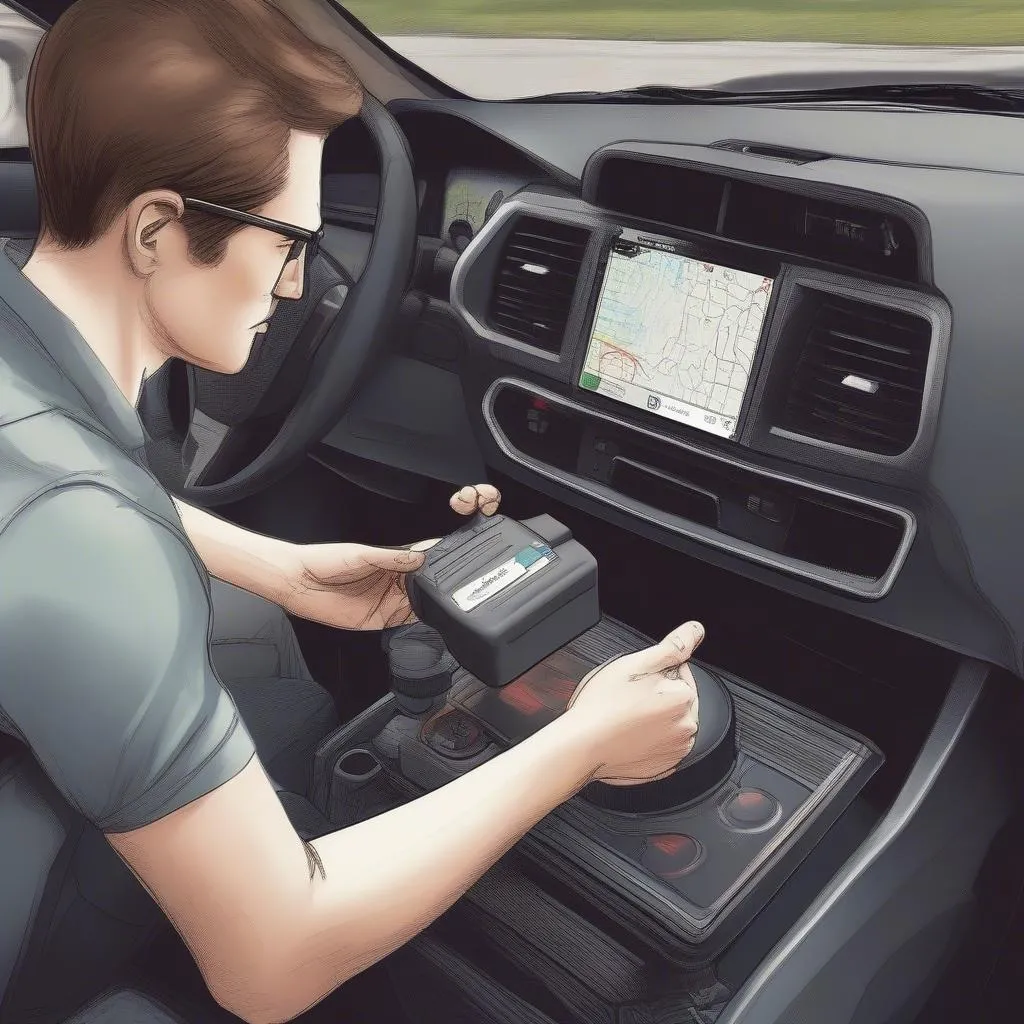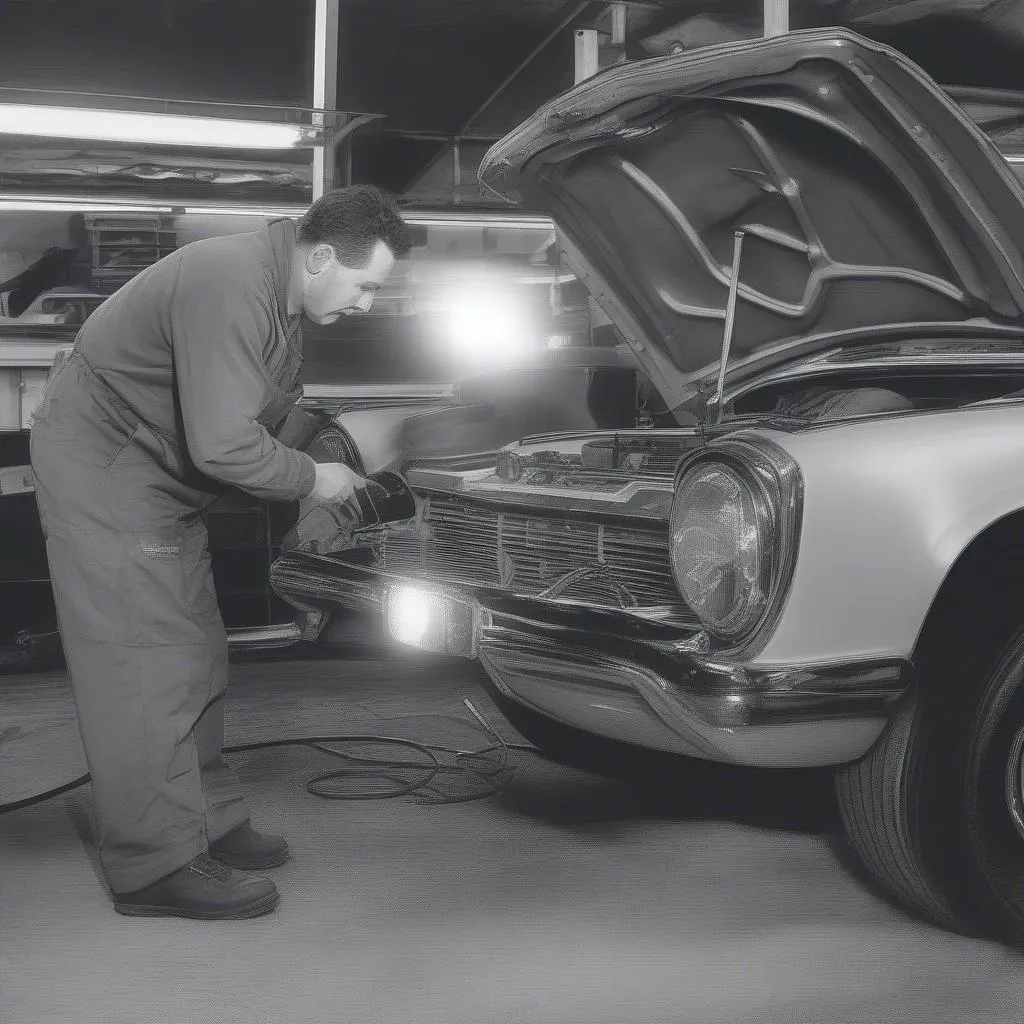Imagine this: you’re cruising down the Pacific Coast Highway in a sleek, pre-owned BMW M3, the California sun warming your face. You found the car at a dealership in San Francisco, a steal at the price, especially with its seemingly low mileage. But a nagging doubt lingers in the back of your mind: can you be absolutely sure those miles are genuine? Could an OBD scanner reveal the truth about your dream car’s history?
Deciphering the Question: What Does “Can Obd Detect Odo” Even Mean?
Let’s break it down. OBD stands for On-Board Diagnostics, and it’s essentially the system your car uses to talk to the outside world about its health and history. An OBD scanner is a handy tool that plugs into your car’s OBD port, usually located under the dashboard. It reads the data stored in your car’s computer, including Diagnostic Trouble Codes (DTCs) that indicate malfunctions. Now, “odo” is short for odometer, the device that tracks your car’s mileage.
So, the million-dollar question is: can an OBD scan uncover potential odometer tampering, like what might have happened with your Californian beauty?
The OBD and the Odometer: A Complicated Relationship
The answer, unfortunately, isn’t a simple yes or no. It’s more nuanced than that.
While an OBD scanner can access a wealth of information about your car’s engine performance, emissions, and even some historical data, its ability to directly detect odometer fraud is limited. Here’s why:
- Data Storage: While some modern vehicles store mileage data in multiple control units (the “brains” of your car’s various systems), older cars might only store it in the instrument cluster, where the odometer is physically located.
- OBD Access: OBD scanners primarily focus on engine and emissions-related data. Accessing mileage information through the OBD port is not standardized across all car manufacturers. Some might allow it, while others might require specialized tools or software.
- Sophistication of Tampering: Gone are the days of simply twisting a cable to roll back the odometer. Modern tampering often involves electronically manipulating the mileage data in multiple control units, making it harder to detect.
The Case of the Suspicious Subaru
Take, for example, the story of John from Austin, Texas. John, a self-proclaimed Subaru enthusiast, found a used WRX STI online that ticked all the boxes. He even ran an OBD scan, which didn’t reveal any red flags. However, John, being meticulous, also checked the car’s service history at a Subaru dealership and discovered discrepancies in the recorded mileage. It turned out the previous owner had tampered with the odometer, and the OBD scan alone couldn’t reveal this.
 OBD Scan Car History
OBD Scan Car History
So, Is an OBD Scan Useless for Spotting Odometer Rollbacks?
Not necessarily. While not foolproof, an OBD scan can still provide valuable clues:
- Error Codes: In some cases, tampering with the odometer might trigger error codes that a scanner can pick up. For example, if the mileage data in different control units doesn’t match, it could raise a red flag.
- Historical Data: Some scanners can access historical data, such as the mileage recorded at the last service. Comparing this to the current odometer reading might reveal inconsistencies.
Insights from the Experts
“While OBD scanners are invaluable for diagnosing engine problems, they shouldn’t be solely relied upon for detecting odometer fraud,” says automotive electronics specialist Dr. Emily Carter, author of “The Car Hacker’s Handbook.” “A thorough inspection by a qualified mechanic, combined with a vehicle history report, is essential.”
Protecting Yourself: Beyond the OBD Scan
So, how can you protect yourself from buying a car with a shady past? Here are some tips:
- Vehicle History Report: Obtain a comprehensive vehicle history report from reputable providers like Carfax or AutoCheck. These reports compile data from various sources, including service records, insurance claims, and title transfers, which can reveal potential odometer discrepancies.
- Professional Inspection: Have the car inspected by a trusted mechanic specializing in the make and model. They can often spot signs of tampering that an OBD scan might miss.
- Scrutinize the Car: Look for physical signs of wear and tear that don’t match the indicated mileage, such as worn-out pedals, faded upholstery, or a heavily scratched gear knob.
 Car Inspection
Car Inspection
Beyond Odometers: Other OBD Mysteries
While the odometer question is a hot topic, it’s not the only thing people wonder about when it comes to OBD scanners. Here are a few other common queries:
- Can an OBD scanner detect a fake catalytic converter? Discover the answer in our detailed article: Can OBD Indicate Bad Catalytic Converter?
- Are there specific OBD scanners for different car brands? Explore the world of specialized scanners in our piece on Dealer Scanner For European Cars.
- Can I use an OBD scanner to diagnose problems with my Jeep? Check out our guide on 2009 Jeep Unlimited OBD Codes for model-specific information.
Your Car, Your Peace of Mind
Buying a used car can be a bit like solving a mystery. While an OBD scanner is a helpful tool in your arsenal, remember that it’s not a magic bullet for uncovering every secret your car holds. By combining an OBD scan with a thorough inspection, vehicle history report, and a healthy dose of skepticism, you can increase your chances of driving off into the sunset with confidence.
Need help deciphering the cryptic world of automotive diagnostics? Our team of experts at Tech Car USA is here to assist you. Contact us via Whatsapp at +84767531508 for 24/7 support on diagnostic tools and car repair guidance.